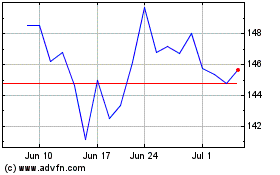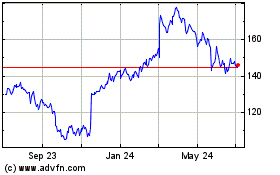Gig Worker Balances Big Paydays Against Coronavirus Risks
March 20 2020 - 12:08PM
Dow Jones News
By Yuliya Chernova | Photographs by Dina Litovsky for The Wall Street Journal
Before the coronavirus pandemic, Joseph Puma's best day as a gig
worker was a $344 haul he notched last year. Last Friday, he nearly
doubled that tally and followed up with another $602 over the
weekend.
Mr. Puma, 38, delivers for Shipt, a Target Corp.-owned startup
that contracts people to buy products at retail stores and take
them to customers' homes. He started in November of 2018 and gets
paid per delivery -- varying rates, plus tips.
A Yale University and seminary grad with a part-time job, he
uses his extra Shipt income to pay off more than $200,000 in
student debt, and keep up with health-care premiums and other
bills.
The growing public-health crisis "seemed like an excellent time
to participate and attempt to gain some financial ground when it
has been so hard to keep up," Mr. Puma said. He said the weekend's
pace of work exhausted him.
Shipt didn't respond to a request for comment, but app research
firm Apptopia put out a blog post this week saying that Shipt,
Instacart and other delivery services had record daily downloads of
their apps.
The boom in demand for delivery comes with another downside.
Confirmed cases of the new coronavirus are rising. The more Mr.
Puma works, the greater his risk of exposure. For instance, a
customer Sunday told him through the door of his home that he had
been exposed to the virus, and then tipped $20 via a smartphone
app.
In addition to a job, Mr. Puma sees the Shipt gig as a public
service. "I choose to assume some of the risks involved with this
work at this time because I continue to care to help people while I
help myself."
Helping people by delivering groceries has gotten more
complicated and stressful in recent days.
Last Friday he endured a 50-minute line at a Fairway Market in
Manhattan. Because he relies on public transportation, he walks
around with bags loaded with items like 12-packs of soda and takes
them on the bus. Mr. Puma often composes texts to customers telling
them an item they want is out of stock and suggesting replacements
whenever possible.
"Each shopping trip feels like a sort of performance," Mr. Puma
said. Over the past few days many Shipt customers have been placing
their first orders. So, he spends a lot of time managing
expectations. "Sometimes that means writing a novel in a text."
Recently, he sent a picture of a long line to a customer, and
followed up with updates like " 1/3 of the way past the frozen
section."
Mr. Puma delivers more than just food. One order requested bed
sheets, pillow cases, a candle and Scrabble. Everything but the
board game was in stock.
Empty bread shelves and bare frozen-vegetable sections pose a
problem. Customers can indicate through an app that their whole
order should be canceled if one of the items on their list isn't
available. This can necessitate some finesse and lots of
communication.
Such was the case with a large order that included 25 pounds of
flour. Halfway through fulfilling it, Mr. Puma realized the store
didn't carry the right flour. He found 10 pounds of another brand
sitting on a restocking cart and sent a picture to the customer,
who agreed to settle for the alternative.
After navigating the store comes the job of distributing items
-- often including bottles of juice and bulk goods -- in flimsy
paper bags mandated since March 1 by New York. Mr. Puma reviews
orders ahead of time to see if he needs additional equipment.
On one trip he lugged his two-wheel dolly, a heavy steel
shopping cart, insulated bags, sanitizers and gloves. Mr. Puma
alerts new customers in introductory texts that he uses latex
gloves and hand sanitizer when picking out their items in stores.
As an extra precaution, Shipt urges workers to drop items outside
customers' doors instead of carrying them in.
Mr. Puma wants a break, and is planning to spend next week with
his partner, working on remote paid projects, taxes and his search
for a full-time job. He will also be wrestling with the decision of
whether to continue the delivery job.
"I am hesitant to do another blitz," he said this week, "because
it seems to be more risky."
Write to Yuliya Chernova at yuliya.chernova@wsj.com
(END) Dow Jones Newswires
March 20, 2020 11:53 ET (15:53 GMT)
Copyright (c) 2020 Dow Jones & Company, Inc.
Target (NYSE:TGT)
Historical Stock Chart
From Mar 2024 to Apr 2024

Target (NYSE:TGT)
Historical Stock Chart
From Apr 2023 to Apr 2024
